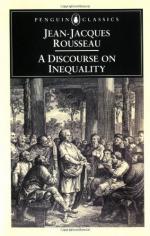
|
| Name: _________________________ | Period: ___________________ |
This test consists of 15 multiple choice questions and 5 short answer questions.
Multiple Choice Questions
1. What type of government worries Rousseau?
(a) Democratic.
(b) Dictatorship.
(c) Green.
(d) Republican.
2. How did Rousseau feel men treated morality before art?
(a) Men ignored it.
(b) Men were ignorant to it.
(c) With passion.
(d) Men had a rude but natural morality.
3. What does Rousseau argue at the beginning of "Chapter 2, A Discourse on the Moral Effects of the Arts and Sciences, Part II"?
(a) Many civilizations believe that art arose from an enemy of humanity.
(b) Many civilizations believe that science arose from an enemy of humanity.
(c) That the government is corrupt.
(d) That the arts are corrupt.
4. What does Rousseau argue about the discovery of the nature man?
(a) It is natural and innate.
(b) There is direct evidence.
(c) It is odd and perplexing.
(d) There is no direct evidence.
5. What must Rousseau first figure out before writing "A Discourse on the Origin of Inequality"?
(a) The nature of civilization.
(b) The nature of humans.
(c) History of humans.
(d) History of greed.
6. What does Rousseau want everyone to recognize in "Chapter 3, A Discourse on the Origin of Inequality, Dedication and Preface"?
(a) The power of greed.
(b) The authority of the state.
(c) The wealth of the land.
(d) The authority of art.
7. The arts and sciences have helped human beings to repress what according to "Chapter 1, A Discourse on the Moral Effects of the Arts and Sciences, Part I"?
(a) Their wickedness.
(b) Their infatuation.
(c) Their kindness.
(d) Their narcissism.
8. What civilizations does Rousseau follow to track the decline of morality?
(a) The English and Greeks.
(b) The Germans and Irish.
(c) The Romans and Greeks.
(d) The Romans and Germans.
9. Who does Rousseau think promulgates wicked doctrines?
(a) Philosphers.
(b) Priests.
(c) Scientists.
(d) Artists.
10. What does Rousseau say the size of the state should be in order to propose laws freely?
(a) Enormous.
(b) Large.
(c) Small.
(d) Equal.
11. Who does Rousseau thank at the beginning of "Chapter 3, A Discourse on the Origin of Inequality, Dedication and Preface"?
(a) His sovereign lords.
(b) His parents.
(c) His children.
(d) His wife.
12. What does the dissolution of morality follow according to Rousseau?
(a) Luxury and the corruption of taste.
(b) Pride and corruption of intelligence.
(c) Desire and the corruption of soul.
(d) Greed.
13. What type of land does Rousseau prefer to live in?
(a) Where no art exists.
(b) Where everyone is equal.
(c) Where he can live freely.
(d) Where no man is equal.
14. What does Rousseau believe is the reason men now live apart?
(a) To have more land.
(b) Secrecy is best.
(c) To hide their wickedness.
(d) To keep their personal secrets.
15. What would history be empty without, according Rousseau?
(a) Government.
(b) Without tyrants or wars.
(c) Money.
(d) Without greed and power.
Short Answer Questions
1. How did older centuries think of natural law, according to Rousseau?
2. What does Rousseau think the government and society can have?
3. What does one have no time to learn when he or she is learning science, according to Rousseau?
4. Who is Rousseau saddened by in "Chapter 3, A Discourse on the Origin of Inequality, Dedication and Preface"?
5. According to Rousseau, what ancient thinker praised ignorance?
|
This section contains 515 words (approx. 2 pages at 300 words per page) |

|




